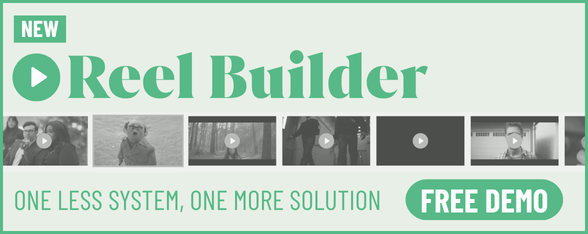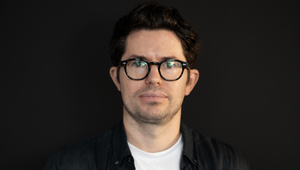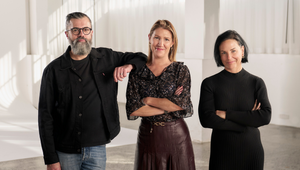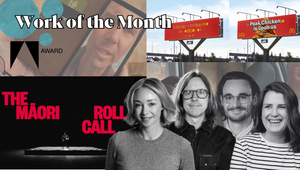
Creativity Squared: Wez Hawes Believes Creative People are Unicorns

Wez Hawes, executive creative director at Innocean Australia, male member of Fck The Cupcakes and advocate for Love Our Work has spent over 20 years working within the advertising industry all around the globe.
During his time in London at BBH, he learned the ways of the industry from the legendary, Sir John Hegarty. Over the years of his career, he has been awarded Cannes Lions, D&AD awards, and countless others.
When returning to Australia after three years of being creative director and partner at BBH London, he was appointed ECD at TBWA Australia, before moving to Marcel Sydney, CHEP, and now Innocean Australia.
Wez has worked with brands such as Foxtel, David Jones, Apple, Visa, Heinz and The Sydney Morning Herald.
Person
My whole life I’ve believed creative people are a rare kind of alien species sent to Earth to inspire, entertain and to do good (at least when it comes to Cannes entry time). That’s how I’ve been treated growing up in the industry, especially in my BBH days where even as a junior you had your own office and were given a pass for being, well, a bit odd.
Personality wise, I’m definitely more of an extroverted creative type, but one with a healthy dose of imposter syndrome, anxieties and insecurities I’ve had since I was an advertising student. This means that while I like the sound of my own voice, I can also be found in a private corner weeping when an EDM doesn’t get an open rate over 30%.
Taste wise, I’m into all sorts of stuff, but am easily bored. I jump around. Watch a bit of that, check my phone, listen to this, attend that, ask our fingers-on-the-pulse creative team Lachie and Georgie what’s good in a totally natural and effortless way that is never awkward. I absorb content. Films and shows are my benchmark, rather than other ads. In fact, right now I’m having an existential crisis because I’ve never created anything as brilliant as that Salt Burn ending.
I reveal all of this because I’ve always believed that creative people are unicorns and have always put our kind on a pedestal. That was until a few months ago when I received an ADHD diagnosis. Now I’m questioning this reality and am convinced that the entire global creative community is comprised of hundreds of thousands of people who all think they have superpowers, when the reality is we’re all just a little neurodiverse.
Product
In my opinion, having the responsibility of evaluating and judging creativity is the most crucial role of a creative leader. Hence I’m part of an industry initiative here in Australia designed to elevate the overall standard of creative feedback, in order to nurture creative talent. If you haven’t checked out loveour.work yet please do so. The industry I grew up in wasn’t that particularly nurturing if I’m being honest. One creative director used to simply tread on the ideas he liked after we’d laid them out on the floor (so we’d have to scamp them up all over again). We never really knew what the difference was between the ideas that warranted a size 11 boot print, and those that didn’t.
It's probably because of these types of experiences that I take the time to explain why I do or don’t like something, despite the evaluating process being naturally instinctive and reactive. Even if that means pausing momentarily to contemplate and articulate why an idea isn’t getting me fired up. If people are putting their careers in my hands, it’s my responsibility to nurture and take them to the next level. Repeat after me: we are all worthy of more than a boot mark.
When it comes to judging other agency’s work I always try to watch or consume it with a punter mindset. Especially when judging it for awards. Hence I found myself walking around Centennial Park a few years back with the masses completely enthralled by DDB’s Grave of Thrones experience. Even though I’d rejected the same idea at Marcel a few months earlier because of a ‘political agency situation’. Despite not working with her any more, it’s something that brilliant creative still reminds me of on a far too regular basis.
Process
My creative process is coffee in a café with an Officeworks dollar notepad full of words and scribbles I can’t even read myself the next day. The conceptual thinking happens outside the office; crafting and collaboration inside the office or a group call. So inevitably, when that one person from the office asks why the creatives aren’t at their desks, I always reply that they are actually working.
As an ECD my process is different now. I’ve learnt from some trusting hands-off CDs and some brilliant, yet extremely hands-on ones. Shout out to my favourite Canadian! I like to think I sit in the middle. Close enough to help, far enough away not to hinder. Reviews I’m in are also more like informal check-ins and safe spaces to just chew the fat. Brain farts are welcome.
The best example of this more organic approach in practice was for our Fantastical Sharks and Rays project for AMCS (Australian Marine Conservation Society) currently in development. It started as a thought from Innocean copywriter, Charlotte Berry, that involved bringing children’s drawings of marine animals to life in some way. We knew there was something in it, so every month or so we would discuss and remind ourselves it was still there. Eventually, the right opportunity came along and as we dragged more Innocean brains into the fold, that tiny nugget of an idea has became an exhibition at the Australian Museum featuring the most iconic artists in Australia. At each stage we resisted the use of AI, staying true to the initial idea of using children’s imaginations (or ‘CI’) to bring these rarely seen endangered sharks to life. That initial thought could easily have been an untrodden scamp thrown in the bin with nothing but a grunt to commemorate its death.
The pic of me is in my home office, surrounded by a few of the entries for the project from children all over Australia.

Press
My creative background is eclectic. I’ve worked in London, Amsterdam and Sydney, and for a variety of specialist agencies. I started my career at below-the-line (direct) agencies and was quite successful, winning heaps of awards in my first couple of years. One of those direct agencies was Harrison Troughton Wunderman in London where I had the fortune of working under Steve Harrison. A creative leader I hugely respect, but who petrified me. He was a tyrant when it came to copywriting and the art of selling. So much so, he still gets into it on LinkedIn with the anyone who sprouts purpose over profit. I now voyeuristically observe these interactions from the relative safety of my mobile screen here in Australia.
Unluckily for me, my early below-the-line success meant nothing to the bigger above-the- line agencies in London. To get into BBH I had to take a placement role that paid travel costs only, which after a year or so (you read that right) eventually became a junior salary. That was where I learned all about big productions, film craft and how to create huge integrated global campaigns. Plus how to have fun and enjoy the process while doing it.
Australia is a different beast altogether. I’ve learnt so much from the agencies I’ve worked at here, which is my number one requirement when assessing a role. What’s different about it? How will I learn and develop? What scares me about the role? Whether it was Marcel, CHEP, or Innocean where I am now, each offered me something new that I hadn’t experienced previously. I’ve stayed curious, embraced the awkward, and gravitated towards anything that pushed me out of my comfort zone. I can’t ever see that last clumsy sentence being etched on an agency wall, but that’s my creative philosophy anyway.















